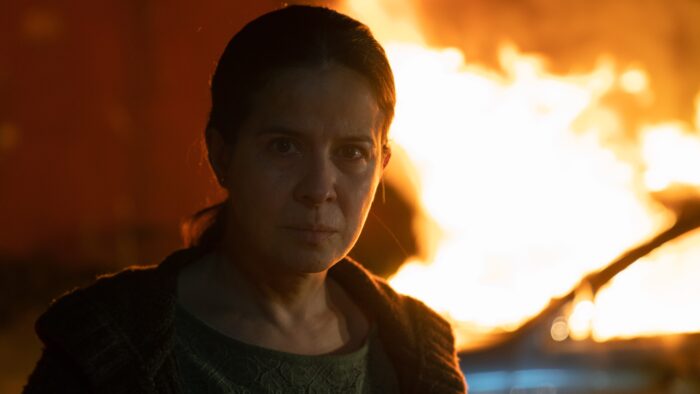VOD film review: La Civil (2021)
Review Overview
Arcelia Ramírez's mesmerising, moving performance
8Harrowing naturalism
8Anatomisation of tentacular criminality
8Anton Bitel | On 14, Mar 2022
Director: Teodora Mihai
Cast: Arcelia Ramìrez, Álvaro Guerrero, Jorge A Jimenez
Certificate: 15
“I love you too. See you later,” Laura (Denisse Azpilcueta) tells her mother, Cielo (Arcelia Ramírez), as the teenager heads out on a date with her boyfriend, Lisandro (Manuel Villegas). Cielo’s husband, Gustavo (Álvaro Guerrero), has long since left her for the much younger Rosy (Vanesa Burciago), and now mother and daughter live together in happy poverty.
Although this is the opening sequence from La Civil, it is also the last time Laura will be seen on screen, as the film’s remaining two or so hours will be defined entirely by her absence, and by the gaping emptiness that this leaves in Cielo’s life. Laura is abducted by a cartel and, even after Cielo and Gustavo pay the ransom, the girl is not handed back over, causing the mother to go on an obsessive search for her missing daughter – like the mythical mother Demeter frantically looking for Persephone, only in the criminal demimonde of contemporary Mexico rather than in Hades’ more literal Underworld.
Romanian director Teodora Mihai (Waiting for August), who co-wrote La Civil with Habacuc Antonio De Rosario, brings her documentarian’s eye to Cielo’s haunted quest. The mother’s private investigation is shot by Marius Panduru with largely handheld camerawork that sticks close to Cielo and heightens the (constructed) naturalism of her experiences, offering an anatomisation of a society corrupted from top to bottom by the criminal gangs. Receiving no help from either the police or (initially) the army, Cielo starts tracking the gangs’ movements herself at a funeral home (where they collect the bodies of their fallen) and at the small shops that they are shaking down – and the local information that she gathers proves so good that soon a secretive cadre of the military, led by Lamarque (Jorge A Jimenez), is inviting her to collaborate on their extrajudicial missions deep into gangland.
As all this unfolds, we see Cielo transform from an aproned mother – too timid to approach her husband for missing alimony cheques – to a steely, determined, independent pursuer of justice willing to confront anyone and anything. That said, this is not Tony Scott’s Man on Fire. While certainly displaying the kind of fearlessness that only desperation can bring, Cielo is no elite agent with a set of special skills (even if she does become uncomfortably embedded in some special military operations), but rather, as the film’s title states, a civilian – and importantly, unlike Denzel Washington’s character in Man on Fire or Jack Lemmon’s and Sissy Spacek’s characters in Costa Gavras’ Chile-set Missing, Cielo is no outsider. She is horrified to see first-hand the criminality of her own country.
“I have come to see if you have any humanity left,” Cielo will say near the end, confronting someone she suspects was involved in her daughter’s abduction. By this stage, when Cielo has witnessed up close the brutality of both sides in this war – and even herself participated in it – her words apply equally to her own person, dehumanised by the all-consuming, soul-destroying reality of cartel predations on Mexican society. La Civil is an unremittingly bleak portrait of a nation ruled by anomie and injustice – but after all its hard, vicious realism, it turns at its very end back to myth, and to an ambiguous glimpse at hope, even a guarded happiness, resurrected.
This review was originally published during the 2022 Glasgow Film Festival.



















